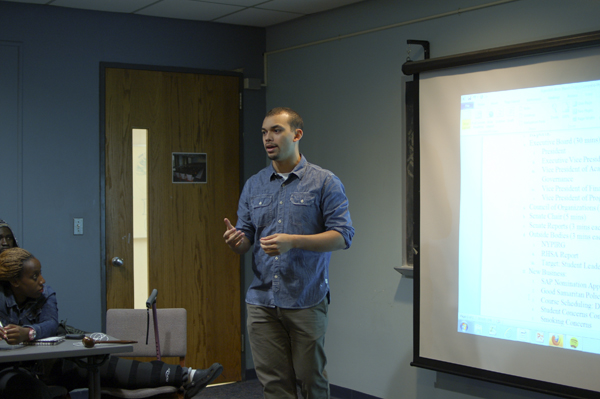
The Academic Senate (SA) has been crafting a goals list, aiming to keep both Executive board (E-board) members and senators organized and receptive to the needs of the campus community.
“In a school of about 8,000, where 25 people can take on two goals apiece and find others that are interested, it’s more tangible,” SA President Terrell Coakley said.
Coakley said the idea of a goals list is “genius.” He said the list holds SA more accountable and “accountability has a role in getting stuff done.”
The goals list was an idea proposed by Senate Chair Alberto Aquino last semester. Senators can add to the list during their senate meetings and also present their progress on already stated goals.
The list has both tangible and abstract objectives. Some include finding solutions to high textbook prices and E-ZPass discounts for commuter students to overall improving communication and working on a senate television show on campus.
“[The list] places more pressure on everybody,” Aquino said. “It publicizes senate, we have to accomplish goals and advocate for the student body.”
The legislative body didn’t drag their feet. Aquino said some goals were constructed at the first senate meeting where members had to pick one goal to work on for the current semester. “Multiple leaders” were chosen for the different goals, and these leaders are in charge of coming back with status updates on the task.
The idea, Aquino said, was to put more responsibility on the legislative body.
Aquino called the ideas on the list fantastic, and said the senate was coming up with innovative ideas to tackling issues on campus. Aquino said members are coming up with ideas that he has never considered, like the E-ZPass discount. Where he might have gotten used to things while living on campus, he said a cross-section of students have the power to address this.
“They see it as something possible to change,” Aquino said.
The goals list has transformed the role of E-board members, according to Coakley. He said they’ve become “product pushers,” as they propose a problem and then it goes through a solving process.
Still, the goals list has also given the legislative body more time to talk, changing the course of senate. New legislation has limited the number of appeals the senate now hears. Only those that are deemed to be conducted unethically or unconstitutionally by the Budget and Finance Committee. Coakley said about 40 hours of a semester were “hindered” listening to appeals. Now, members get to have free-range discussions concerning “real stuff,” such as goals on the list.
Sen. Matt Clarkson said the list was very effective in showing people what senate does every week.
“Before the list, there wasn’t a clear picture of what people had done,” he said.
He said due to the list, the senate has accomplished a lot more. Clarkson is currently focused on lowering textbook prices. Once this is done, he will bring these ideas to the department heads. Overall, he said the goals can come to fruition and progress can be made.
“Working together, we can make a serious impact on campus,” Clarkson said.
Meanwhile, Aquino said every goal, “except getting a printer in the Student Union,” was accomplished last semester. The printer idea was placed on the goals list this semester and feasibility options were put forth by a senator.
Coakley said since most E-board members will be graduating, he hopes that whoever fills the positions “has the drive to do [the goals] effectively.” He said the important thing to do is to “build a precedent” that people want to follow. This idea exists to build upon existing policy instead of “wasting a whole year trying to change things.”
“Someone has the drive, the drive to help you,” Coakley said. “Every goal is reachable, or attackable in some sense. Something can be done. You’re talking to the right people.”
